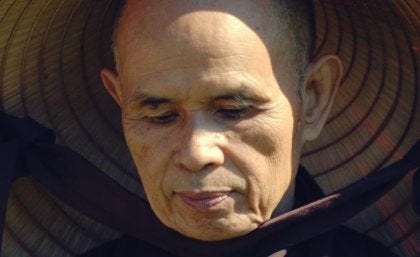Thich Nhat Hanh is 91 years old and a Zen teacher par excellence, productive writer, poet and promoter of internal transformation through meditation, this friendly, serene and inspiring Buddhist monk stands out above all for his great activism for peace and human rights.
Anyone who hasn’t read any of his books will probably think we’re up against another Buddhism guru; However, Master Hanh is much more than that. His heritage and extensive work combine exceptional nuances of great interest and value, on the one hand he understands all the wisdom typical of the most remarkable traditional currents of Buddhism, on the other, he knows how to apply them through the methods of modern psychology.
“Every moment is a gift of life” – Thich Nhat Hanh-
One of Nhat Hanh’s main virtues was to bring Westerners in a solid and simple way to any Zen practice, moreover, if today we know and deepen concepts such as mindfulness is because people like Hanh have translated and refined this ancestral heritage into an accessible and useful resource and philosophy for all.
On the other hand, in addition to this didactic and inspiring work of this Buddhist monk, his own life must be evoked. The “Vietnamese master,” as they are called, practiced what he defines as committed Buddhism. He realized that his religion was not contemplative and passive of isolation in a monastery. He participated in the Vietnam War by caring for his people, establishing schools and assistance services to rebuild towns and villages.
As we see, we are faced with a figure of great social and spiritual significance who deserves our attention.
Thich Nhat Hanh was born in Vietnam in 1926, taught at Columbia University at the Sorbonne and was even nominated by Martin Luter King Jr. for the Nobel Peace Prize in 1967. life in a Buddhist community near Bordeaux that he founded in 1982.
A tireless writer and transmitter of Zen Buddhist philosophy, he draws attention to the profound simplicity with which his messages manage to conquer us. In books such as “Paths to Inner Peace”, “The Essence of Buddha’s Teachings” or “The Miracle of Mindfulness,” he “transmits concepts, ideas, and principles where doctrine blends with wisdom and psychology itself.
Let’s look at some of these lessons, fragments of a wisdom full of nuances and beauty that still inspire us.
“The source of love is within us and we can help others realize that happiness is at your fingertips. Is one word, one action and one thought enough to reduce someone else’s suffering and give them joy?
The University of Michigan and Tohoku University in Japan conducted a study in 2006 showing this relationship, so people with an open and positive attitude who promote acts of kindness in their nearest environment always generate very beneficial changes in others: they improve mood, create bonds of trust and alleviate laments and concerns.
If we could practice a healthy exercise in kindness and respect every day, as Thich Nhat Hanh himself teaches, we could change the world.
“You must love in such a way that the person you love feels free. “
The Vietnamese master says clearly: to love someone is to offer attention, a presence capable of making the other flower as if it were the most beautiful flower. From now on, all attention to the people we love should foster non-oppressive growth. a affection that leads to freedom, which extends its roots towards fullness and its petals towards enlightenment.
Thus, as he explains in his books and lessons, the best we can offer to the world is this true love that cares for and respects all the species of this planet, a noble and well-intentioned energy that transforms the cosmos itself.
Don’t avoid contact with suffering. Do not lose consciousness of the existence of this reality in the world. Find ways to be with those who suffer by all means, including personal contacts, visits, images, sounds ??
These words, spoken by Thich Nhat Hanh in one of his speeches, demonstrate this active commitment to those who suffer so much and define it so much, while drawing attention to this need to be aware of it in every way: to see the pain of others, feeling it and even listening to it.
Because the one who suffers has a face, the one who has a hard time proves it with his actions and his voice, besides, the one who suffers can be close to us, with us and sometimes we do not even hear them. Therefore, let us become aware of this recurring reality in our daily lives.
“Fear keeps us focused on the past or worried about the future. If we can recognize our fear, we can see that we’re doing well right now. Right now, today, we’re alive and our bodies are working perfectly. We still see the beautiful sky Can our ears continue to hear the voices of our loved ones?
This reflection of the Vietnamese master is undoubtedly one of the most beautiful, just and wise, it is not just about fear, it is about controlling and knowing how to go beyond that useful but often mismanaged emotion, which limits our lives. Fear must promote our survival, not stop it.
Therefore, nothing better to appreciate the current moment than to perceive something very simple: we are alive, life goes on and we have the ability to move forward in the company of our own, in phase with a world in which we are intimate. and part precious.
In conclusion, one thing that draws attention to Nhat Hanh’s philosophy is the ability to combine a wide variety of traditional Zen teachings with different currents of Buddhism and modern psychology. Everything is harmonized, everything is fine and everything is inspiration. Therefore, your contributions, advice and thoughts are always as understandable as they are valuable in fostering our personal growth.
This Vietnamese master is a living legend whose legacy will never be extinguished.

